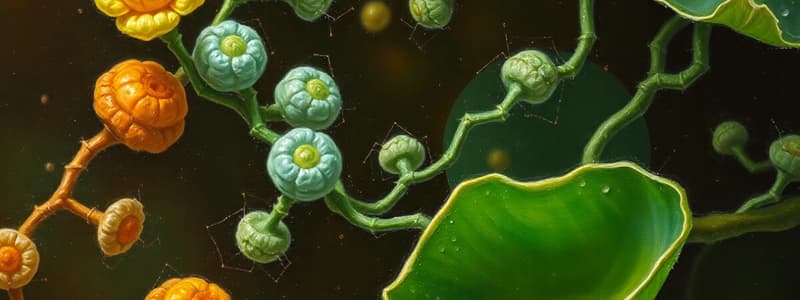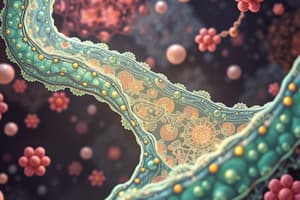Podcast
Questions and Answers
Which of the following describes the process of dehydration synthesis?
Which of the following describes the process of dehydration synthesis?
- The process of adding water to split molecules apart.
- The formation of large molecules by combining smaller units and releasing water. (correct)
- The breakdown of polymers into monomers.
- The conversion of glucose into energy.
What is the primary purpose of enzymes in biological reactions?
What is the primary purpose of enzymes in biological reactions?
- To serve as products in metabolic pathways.
- To act as substrates in reactions.
- To increase the activation energy required for reactions.
- To speed up the reactions by lowering the activation energy. (correct)
Which type of transport requires energy to move substances across a membrane?
Which type of transport requires energy to move substances across a membrane?
- Facilitated diffusion
- Passive transport
- Osmosis
- Active transport (correct)
What is the main difference between prokaryotic and eukaryotic cells?
What is the main difference between prokaryotic and eukaryotic cells?
Which stage of the cell cycle is characterized by DNA replication?
Which stage of the cell cycle is characterized by DNA replication?
What is the function of NADPH during photosynthesis?
What is the function of NADPH during photosynthesis?
What is the primary function of ribosomes?
What is the primary function of ribosomes?
Which type of mutation involves a change in a single nucleotide?
Which type of mutation involves a change in a single nucleotide?
What is generated during cellular respiration?
What is generated during cellular respiration?
What functions do exons serve in gene expression?
What functions do exons serve in gene expression?
Flashcards
Hydrolysis
Hydrolysis
The process where a large molecule is broken down into smaller subunits, often by the addition of a water molecule.
Dehydration Synthesis
Dehydration Synthesis
The process where two smaller molecules are joined together to form a larger molecule, often with the removal of a water molecule.
Enzyme
Enzyme
A biological catalyst that speeds up the rate of a chemical reaction by lowering the activation energy required.
Substrate
Substrate
Signup and view all the flashcards
Activation Energy
Activation Energy
Signup and view all the flashcards
Photosynthesis
Photosynthesis
Signup and view all the flashcards
Cellular Respiration
Cellular Respiration
Signup and view all the flashcards
DNA
DNA
Signup and view all the flashcards
DNA Replication
DNA Replication
Signup and view all the flashcards
Protein Synthesis
Protein Synthesis
Signup and view all the flashcards




